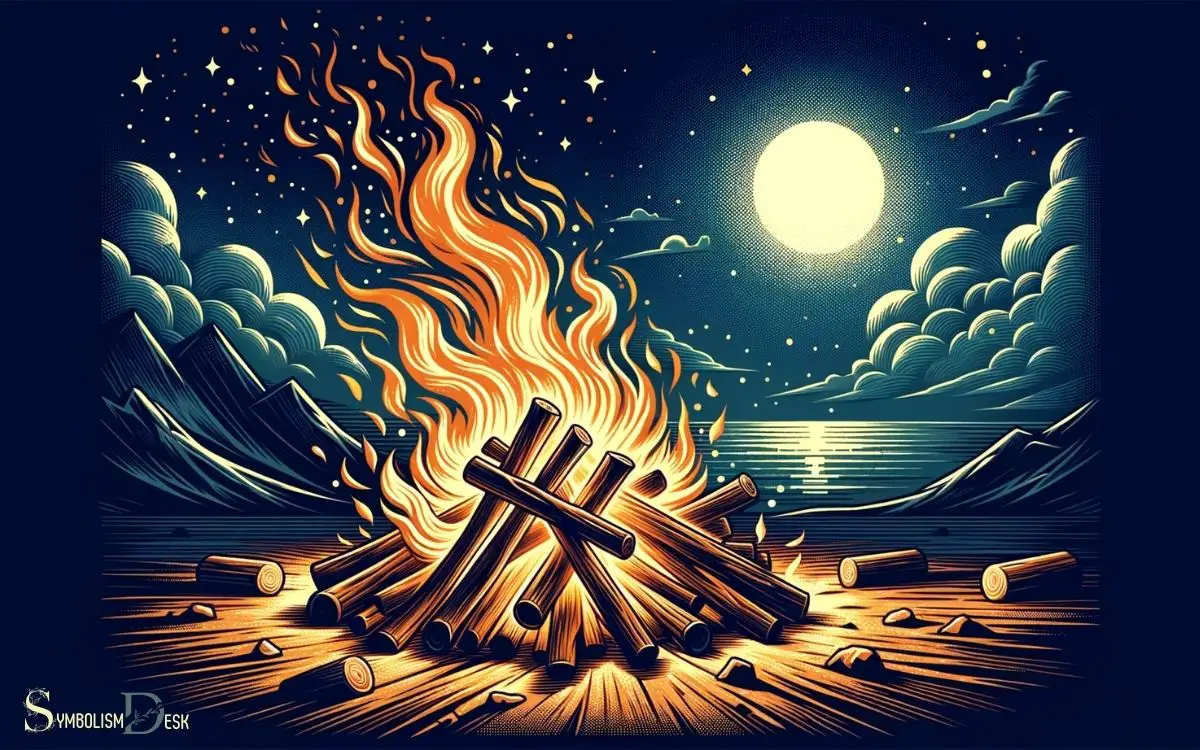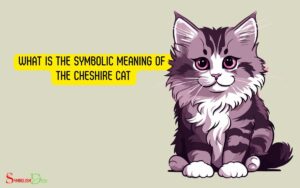What Is the Symbolic Meaning of Fire? Life!
The symbolic meaning of fire encompasses transformation, life, death, rebirth, passion, and enlightenment. It is a powerful element that resonates with human emotions and spirituality, representing both destruction and creation.
Fire signifies warmth and comfort as well as danger and chaos, making it a complex symbol with dual meanings in various cultural, religious, and philosophical contexts.
Fire’s symbolism is often associated with:
- Transformation and Change: Fire’s ability to change the state of matter symbolizes transformation and the process of change.
- Passion and Desire: The heat of fire is frequently linked to the intensity of passion or the fervor of desire.
- Purification and Renewal: Many cultures use fire in rituals to signify purification, as it is believed to cleanse and renew.
- Light and Guidance: Fire provides light in darkness, symbolizing knowledge, truth, and guidance.
- Destruction and Danger: The destructive nature of fire represents the potential for danger and the consequences of carelessness or unchecked power.
For example, in many mythologies, a phoenix rising from ashes represents rebirth and immortality, which is a direct association with fire’s regenerative properties.
As an elemental force, fire’s duality as a giver of warmth and a potential destroyer adds to its enigmatic symbolism.

Key Takeaway
Fire as a Symbol of Transformation
The symbolic meaning of fire as a tool for transformation has been recognized in cultures across the world. Fire is often seen as a potent symbol of change and renewal. It has the power to both destroy and create, making it a fitting representation of transformation.
In various mythologies and religious traditions, fire is depicted as a catalyst for personal and spiritual growth.
The process of burning away the old to make way for the new is a prevalent theme associated with fire symbolism. In alchemy, fire is considered essential for the purification and transformation of substances.
This symbolism of fire as a force of change resonates with people seeking personal or societal transformation, making it a powerful and universal symbol across different cultures.
The Destructive Power of Fire
Fire has long been recognized as a formidable force of destruction. Its ability to ravage entire ecosystems and cause historical devastation can’t be underestimated.
Understanding the destructive power of fire is crucial in comprehending its symbolic significance.
Fire as a Destroyer
Often misunderstood as a mere force of destruction, fire possesses a raw power that can swiftly and ruthlessly consume everything in its path. The destructive nature of fire is evident in its ability to ravage forests, homes, and entire landscapes.
Its ferocity can bring about devastating consequences, leaving behind charred remnants of what once stood in its way.
The destructive power of fire isn’t limited to physical destruction; it also carries emotional and psychological impacts, as it can leave individuals and communities feeling vulnerable and lost.
Furthermore, the destructive force of fire extends to the loss of irreplaceable memories and cherished possessions.
Understanding the potential devastation caused by fire is crucial in fostering respect for its power and in taking necessary precautions to prevent its destructive effects.
Impact on Ecosystems
The ecosystem’s delicate balance can be disrupted by fire’s destructive power, affecting plant and animal habitats. When fires rage through an area, they can destroy plant life, leaving the soil vulnerable to erosion and reducing food sources for animals.
The loss of vegetation also impacts the stability of the ecosystem, as it can lead to changes in water flow and nutrient cycling. Furthermore, the destruction of habitats can displace or harm animal populations, threatening biodiversity.
Additionally, the release of smoke and ash into the atmosphere can have long-term effects on air quality and contribute to climate change. Understanding the destructive impact of fire on ecosystems is crucial for implementing strategies to prevent and mitigate its devastating effects.
This devastation caused by fires has historically had far-reaching implications, affecting not only the immediate environment but also the broader ecological balance.
Historical Devastation Caused
Historical wildfires have left a trail of destruction across landscapes, altering ecosystems and shaping the environment for generations to come.
The destructive power of fire has been evident throughout history, with significant devastation caused by uncontrolled blazes.
These fires have ravaged forests, grasslands, and even urban areas, resulting in the loss of homes, infrastructure, and livelihoods.
The historical impact of these fires extends beyond the immediate destruction, influencing the recovery and regeneration of ecosystems.
Additionally, these devastating events have shaped the way societies perceive and manage the risk of wildfires, leading to advancements in firefighting techniques and policies aimed at prevention.
Understanding the historical devastation caused by fires is crucial in developing strategies to mitigate their destructive effects and protect the environment and communities from future disasters.
Fire’s Representation of Passion and Desire
Fire has long been associated with passion and desire, serving as a symbol of intense emotions and primal energy.
Its transformative power can be seen in the way it ignites and consumes, representing the fiery nature of human desires and the drive for change and renewal.
In exploring fire’s representation of passion and desire, it’s essential to consider its primal energy and its ability to transform, offering insights into the symbolism of fire in relation to human emotions and desires.
Fire as Primal Energy
Symbolizing intense emotions, fire embodies primal energy, expressing passion and desire in various cultural and symbolic contexts. In many societies, fire represents the raw power of passion and desire, serving as a profound symbol of human emotions and instincts.
Here’s why fire is seen as primal energy:
- Fire’s uncontrollable nature mirrors the intensity of primal emotions.
- The warmth and light of fire symbolize the passion and desire that ignite the human spirit.
- Fire’s ability to both create and destroy reflects the dual nature of primal energy in expressing love and anger.
- Across diverse cultures, fire rituals are used to channel and honor the primal energies of passion and desire.
Understanding fire as primal energy enables individuals to appreciate its representation of deep-seated emotions and the driving force of human desires.
Fire’s Transformative Power
Representing the transformative power of passion and desire, fire serves as a symbol of intense emotions and primal energy, embodying the dual nature of creation and destruction.
When associated with passion, fire symbolizes the burning intensity of love, lust, and ambition. It embodies the fervor and ardor that drive individuals to pursue their deepest desires and goals.
Fire’s transformative power is evident in its ability to both create and destroy. It has the capacity to ignite new beginnings, fueling innovation and change, while also consuming and purging the old, making way for transformation.
In various cultures, fire rituals are employed to symbolize the purification of the soul and the release of inner desires. Its representation of passion and desire is a universal concept that transcends cultural boundaries, resonating with individuals seeking to harness their inner fire.
Fire as a Source of Illumination
Frequently, fire illuminates the darkness, providing clarity and warmth in various symbolic contexts. Fire’s role as a source of illumination holds deep symbolic meaning across cultures and traditions.
Its representation goes beyond physical light, often embodying enlightenment, knowledge, and spiritual awakening.
In various contexts, fire serves as a powerful symbol of illumination, conveying different meanings such as:
- Enlightenment and wisdom
- Spiritual awakening and transformation
- Guidance and direction in times of darkness
- The illumination of truth and understanding
These symbolic interpretations highlight fire’s capacity to dispel darkness, both literally and metaphorically, offering insight and understanding to those who encounter its radiant glow.
Cultural and Religious Symbolism of Fire
Fire holds significant cultural and religious symbolism as it’s revered in various traditions and belief systems worldwide.
In many cultures, fire represents purification and renewal. For example, in Hinduism, fire is a central part of rituals, symbolizing the divine presence and the burning away of impurities.
In Zoroastrianism, fire is considered a symbol of purity and is revered as a representation of the divine.
In Christianity, fire symbolizes the Holy Spirit and is associated with spiritual illumination and the presence of God.
Additionally, fire is often used in cultural celebrations and festivals, such as the bonfires of the Midsummer festival in many European countries.
Fire Symbolism in Mythology and Folklore
Mythology and folklore across various cultures incorporate fire as a symbol with diverse meanings and significance.
In many myths and folktales, fire represents both creation and destruction, embodying the duality of life and death.
Here are some common fire symbols in mythology and folklore:
- Prometheus and the Gift of Fire: In Greek mythology, Prometheus stole fire from the gods and gave it to humanity, symbolizing knowledge and civilization.
- The Phoenix: Across cultures, the phoenix is a symbol of rebirth and renewal, as it’s consumed by fire and then rises from its own ashes.
- Fire as a Purifying Force: In many traditions, fire is seen as a purifying force, capable of cleansing and renewal.
- The Fire Dance: In various cultures, the fire dance symbolizes a connection to the divine and serves as a means of spiritual transformation.
How Does the Symbolic Meaning of Bread Compare to the Symbolic Meaning of Fire in Regards to Life?
The symbolic meaning of bread represents nourishment, sustenance, and community in many cultures. Similarly, the symbolic meaning of fire represents passion, transformation, and destruction. Both symbols hold significant importance in the cycle of life, as they represent essential elements necessary for survival and growth.
Contemporary Interpretations of Fire Symbolism
The contemporary interpretation of fire symbolism in various cultures continues to emphasize its significance as a powerful force for transformation and renewal.
In modern contexts, fire is often seen as a representation of passion, inspiration, and the spark of creativity. It’s a potent symbol of energy and vitality, signifying the burning desire for change and progress.
Moreover, fire is frequently associated with purification and the burning away of obstacles or negativity, paving the way for new beginnings. In some cultures, it also symbolizes destruction and the potential for chaos if not carefully controlled.
Conclusion
Fire holds a rich and complex symbolic meaning that transcends cultures and time periods. It represents transformation, destruction, passion, and illumination. Fire’s transformative power is often seen in ancient myths and legends, where it is used to symbolize the renewal and rebirth of the natural world. Its destructive qualities can be seen in the way it can consume and change everything it touches. Additionally, in many cultures, fire is used to illuminate the darkness, both physically and metaphorically, representing the way knowledge and understanding can bring clarity to confusion. In many traditions, fire is also associated with the understanding blood symbol, signifying its connection to life and vitality.
The image of fire conjures up feelings of warmth and intensity, as well as the power to change and renew.
Its significance in mythology, religion, and folklore adds layers of depth to its symbolism, making it a powerful and enduring symbol in human consciousness.






